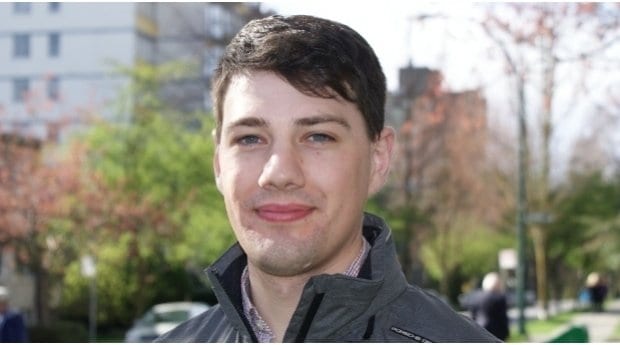Of the 11 openly LGBT candidates who ran for seats on Vancouver’s city council, school and park boards Nov 15, only one — Councillor Tim Stevenson — was elected. Incumbent park board commissioner Trevor Loke, who with Stevenson was one of two gay people elected in Vancouver’s last civic election, three years ago, fell about 1,400 votes short of keeping his seat this time.
That has left both the school and park boards without direct gay representation at the commissioner or trustee level. Given the opposition faced by the Vancouver School Board (VSB) when it amended its anti-homophobia policy in June to make it more supportive of trans students, one former school trustee is now concerned about the amendments’ implementation.
“I just worry there’s no one there who will champion the policy, really work to ensure that it has the funding that it needs to really be implemented and carry it through,” says Jane Bouey, who served two terms on the school board, ending in 2011, and ran unsuccessfully for reelection this time.
Prior to the Nov 15 election, Vision Vancouver held a majority on the school board, with six out of nine seats (after former COPE trustee Allan Wong crossed the floor to join Vision in 2013). Now, the seats are divided evenly at four apiece between Vision and the Non-Partisan Association (NPA), with the Green Party’s new trustee, Janet Fraser, holding the deciding vote.
Though returning NPA trustee Fraser Ballantyne supported the trans amendments, the NPA made headlines when it kicked former trustees Ken Denike and Sophia Woo out of the party’s caucus for their opposition to the policy changes and for not sharing the party’s “same level of sensitivity and understanding of the LGBTQ+ community.”
Reelected Vision school board chair Patti Bacchus, who championed the policy changes, says she is confident they’re in no danger. “I think it’s good the two trustees who opposed those policies are no longer going to be on the board,” she says. “From all indications, the incoming board will be supportive. We’ll work together to make sure we make progress.”
The VSB is also facing a $25 million shortfall in the coming fiscal year, and Bouey worries that the amendments’ implementation will be one of the casualties of cuts. “That’s not to say there won’t be trustees who won’t take that on, but a lot of time will be taken up with other things,” she predicts.
“The scary thing is we really have a train coming at us full speed ahead with a looming deficit of about $25 million,” Ballantyne acknowledges, though he insists nothing will change with the new board. “It’s going to be moving forward on this one,” he says. “All of us on the board are on the same wavelength with this policy, but we’re going to have to come up with more creative ways to raise money to pay for it.”
Incoming trustee Janet Fraser, who will now hold the deciding vote between Vision and the NPA, tells Xtra she supports the policy and plans to look to the community for advice on its implementation.
The Green platform even promised to make the VSB’s part-time staff position dedicated to LGBT resources and education full-time, according to Fraser, who hopes to continue working with defeated gay Green candidate and teacher Mischa Oak.
“Working with Mischa on the campaign, he has talked quite a lot about situations he’s seen in schools. Gay students are not getting the respect or support they need, and we need to correct that situation for all students in our schools,” Fraser says.
On the now NPA-led park board, John Coupar, whom many expect to become the new chair, says he’s very supportive of the work done by the Trans and Gender-Variant Working Group, whose 77 recommendations to make Vancouver parks and recreation facilities more welcoming to trans people were unanimously approved in April.
“It’s something I can throw my support behind,” Coupar says. “We have a very inclusive group of candidates, and there is no issue there at all.”
Of the seven seats on the park board, the NPA now holds four, up from two the previous election, while Vision holds one (down from five last election), and the Green party holds the remaining two seats.
Coupar points to the unanimous vote in favour of the trans working group’s recommendations and says that while Loke was the liaison to the group, someone else will now step into his role.
“I hope that our work continues,” Loke says. “We put a lot of work into the policy. We did 14 months of consultation with the community, drafting a collaborative report that was community-led.”
Loke has offered to continue with the working group and says its strength lies in its bottom-up approach. “I was a resource to the group rather than a leader, and we were able to arrive at our decisions by consensus,” he says. “When we weren’t sure about a policy to recommend, we went out into the community to ask more questions.”
City staff will provide an update on the implementation of the 77 recommendations to the outgoing park board on Dec 1.
With Loke no longer representing Vancouver’s queer community on the park board, the election has also resulted in less diversity on both the school and park boards overall. “We lost a few people of colour, as well as an aboriginal trustee,” Bouey says. “I think that will have an impact.”
Many of the elected candidates say they want to reach out into communities to engage a greater diversity of people. “What I want to do is get out into the community at least four times a year,” Ballantyne says, “have those meetings in the Mount Pleasant area or south side down at David Thompson or in the northeast at Templeton.”

 Why you can trust Xtra
Why you can trust Xtra


